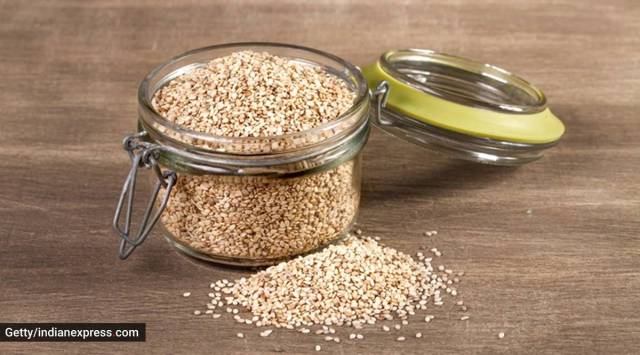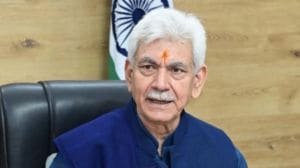Why you should have sesame seeds or til this Makar Sankranti: Good for heart and diabetes
According to Ayurveda, sesame seeds have multiple health benefits, like stimulating digestion, reducing cholesterol and controlling blood sugar levels, says Ayurvedic nutritionist, Dr Smita Pankaj Naram
 Sesame seeds maintain a healthy heart and muscles. They have iron, magnesium, zinc, calcium and selenium. (Photo: Getty Images/Thinkstock)
Sesame seeds maintain a healthy heart and muscles. They have iron, magnesium, zinc, calcium and selenium. (Photo: Getty Images/Thinkstock) Written by Dr Smita Pankaj Naram
Makar Sankranti is celebrated across the Indian subcontinent with regional variations. Commemorating the arrival of spring and the end of long, chilly winter months, it has one constant: sesame seeds or til in the food platters prepared during this time. According to Ayurveda, sesame seeds have multiple health benefits, like stimulating digestion, reducing cholesterol and controlling blood sugar levels, arthritis and heart disease. With jaggery, they also have a thermogenic effect.
GOOD FOR HEART HEALTH
Sesame seeds maintain a healthy heart and muscles. They have iron, magnesium, zinc, calcium and selenium. These minerals strengthen cardiac muscles by regulating their activity. In addition, sesame seeds have a variety of vitamins, such as vitamin B1, which improve blood circulation and cholesterol levels. A significant risk factor for heart disease and stroke is high blood pressure. Magnesium is abundant in sesame seeds, which may help decrease hypertension. Sesame seeds include lignans, vitamin E and other antioxidants that may help reduce the accumulation of plaque in your arteries and in turn maintain healthy blood pressure. They contain an antioxidant and anti-inflammatory compound called sesamol that deters plaque build-up while oleic acid increases good cholesterol in the body. Black sesame seeds particularly contain sesamin and sesamolin, which are known to reduce bad cholesterol levels. Rich in plant compounds called phytosterols, which mimic the structure of cholesterol, they neutralise cholesterol levels and reduce cancer risk.
TOP CHOICE FOR DIABETICS
Sesame seeds can be incredibly beneficial for people with diabetes, as they contain magnesium, which is thought to improve insulin sensitivity and lower blood glucose levels, as well as lower starch content. Therefore, including sesame seeds in a diabetic’s diet is an excellent plan to manage sugar levels naturally. With their high fibre content, these can help increase the body’s overall fibre levels when consumed frequently. Fibre prevents the body from absorbing sugar and keeps track of the body’s glucose levels. Consuming foods high in fibre lend satiety and control unnecessary hunger pangs. Because of their remarkable nutrient content, sesame seeds increase resistance and, as a result, can treat diseases. And considering diabetes puts you at risk of extra ailments, having strong immunity is crucial to keeping them at bay.
IMPROVE YOUR GUT HEALTH
Sesame seeds have a high fibre content and because of that, they greatly aid digestion. They may also alleviate symptoms like diarrhoea and constipation while protecting the colon and lowering the risk of gastro-intestinal disorders. Improved bowel function means feeding the good bacteria in the gut.
FOR STRONGER BONES
Both manganese and calcium, which are found in abundance in sesame seeds, support the development of strong, healthy bones. Additionally, calcium is involved in hormone release, blood vessel function, muscular contraction and nerve signalling.
Sesame seeds are a good source of dietary protein, with 20 per cent of crucial amino acids. So, they are a perfect choice for vegetarians to meet their protein quotas.
DID YOU KNOW?
Ancient Egyptians used flour of sesame seeds. They were used by the Chinese around 5,000 years ago as the base for the soot that made Chinese ink blocks.
(The author is Ayurved Madhyama and Ayurved Uttama of the Shravan Masa Dakshina Prakisha Samitee, Gujarat, which is recognised by the Central Council of Indian Medicine, New Delhi. She has published research papers in peer-reviewed international journals from USA, Europe on ancient healing)





- 01
- 02
- 03
- 04
- 05


























